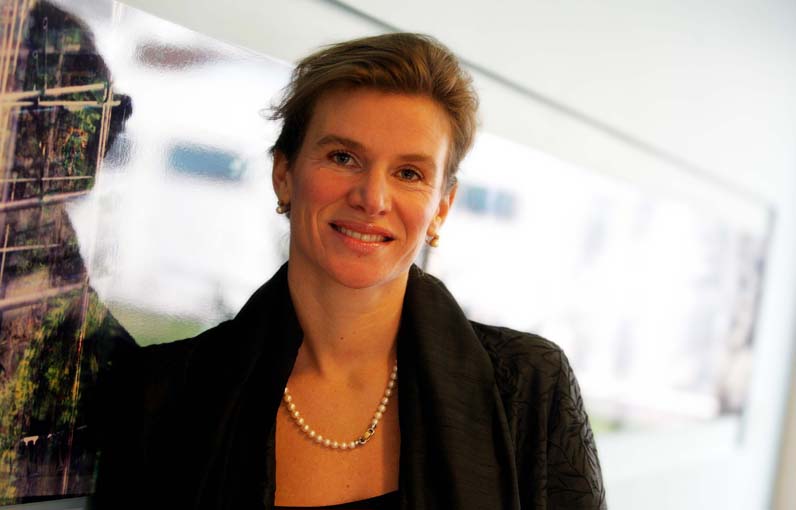
Mariana Mazzucato, Economics ’98, Makes the Case for the Entrepreneurial State
As the battle for the GOP presidential nomination heats up, so too have the candidates’ efforts to “out-conservative” one another. Republican contenders have gone to great lengths to prove their right-wing bona fides, touting their views on everything from illegal immigration and same-sex marriage to health care and climate change. But perhaps the most compelling litmus test of a candidate’s ideological purity is his or her willingness to embrace small-government economics: to cut taxes, slash spending, and reduce investment.
The exercise in one-upmanship was encapsulated by the second Republican presidential debate.
Jeb Bush: “One of the best things we can do is get the government out of the way.”
Carly Fiorina: “This nation’s possibilities and potential are being crushed by government.”
Chris Christie: “[This election] is about … getting this government off your back and out of your way, and letting you succeed.”
Mariana Mazzucato, Economics ’98, isn’t buying any of it. A powerhouse in the field of economic theory, Mazzucato contends that, contrary to the claims of GOP presidential hopefuls, the American economy has benefited immensely from government intervention — particularly in the realm of research and innovation.
Mazzucato, a graduate in Economics from The New School for Social Research (NSSR) explores government’s role in stoking innovation in her widely praised book, The Entrepreneurial State: Debunking Public vs. Private Sector Myths (The U.S. edition, with a new introduction, hits the shelves on Oct. 27). Wielding a mass of data and sharply honed arguments, she dismantles the notion of the laggard state at odds with a dynamic private sector, asserting that, in fact, the opposite is true: The private sector only finds the courage to invest and innovate when the state makes high-risk investments.
“The United States, the preacher of the small-state, free-market doctrine, has for decades been directing large public investment programs in technology and innovation that underlie its past and current economic success,” says Mazzucato, who will speak about her book during an event at The New School on Wednesday, October 28 at 6:30 p.m. “We urgently need to lift the caliber of debate in the election to move beyond the simplistic ‘free market good, big state bad’ doctrine.”
For evidence of the state’s role in driving long-run innovation-led economic growth, look no further than Silicon Valley. Mazzucato doesn’t take anything away from Steve Jobs and Elon Musk; however, their entrepreneurial brilliance tells only part of the story. Many of the essential technologies inside our iPhones — the geopositioning system, the Siri voice-recognition service, the multi-touch screen — emerged from government-funded research. Musk is now riding a similar wave of government investment in space technologies through Space X and Tesla.
“It would all be fine if they admitted getting this support. Instead, they prefer the ‘we made that alone’ narrative,” Mazzucato says. “This is bad for future innovation since the future ‘surfers’ may have a very small wave.”
The U.S. health care system presents another striking example. For years, Republicans have hammered President Obama for helping to create and pass the Affordable Health Care Act (Ted Cruz called it “the very definition of tyranny”). However, Mazzucato says the GOP’s criticisms “aren’t based in economic reality.”
“Obama is accused of meddling in the health care system, but the government has actually given 75 percent of the funds for the research and development into revolutionary medicines,” she says. “In effect, taxpayers pay twice — first, for the research and then, for their insurance bill.”
“Too often,” Mazzucato adds, “the taxpayers take all the risk without getting any reward.”
Mazzucato honed her policy chops at NSSR. Home to generations of radical intellectuals, NSSR was a perfect fit for Mazzucato, who was “interested in studying heterodox economics in a serious way.” Exploring the ideas of figures ranging from Marx and Keynes to Schumpeter and Ricardo, the NSSR Economics program goes far beyond the classical theory that drives many university economics curriculums.
“If you want to think differently about economics, The New School is the place to be,” says Mazzucato, who holds the RM Phillips Chair in the Economics of Innovation in the Science Policy Research Unit at the University of Sussex, England. “You learn a rich, diverse set of theories. It’s a rare haven, not only for heterodox thinking but for rigorous thinking.”
Since graduation, Mazzucato has advised policymakers around the world on innovation-led growth. She is currently a member of the Scottish government’s Council of Economic Advisors, a member of the World Economic Forum’s Council on the Economics of Innovation, and a permanent member of the European Commission’s expert group on Innovation for Growth. In addition, she recently joined the UK Labour Party’s Economic Advisory Committee (a group that includes the famed economists Joseph Stiglitz and Thomas Piketty), which reports directly to the party’s new leader, Jeremy Corbyn.
Now, after years of being entrenched in European economic policy, the Italian-born economist has her eye on the upcoming American election. In a new introduction to her book, Mazzucato urges the GOP candidates to come back to reality and embrace the idea that government has an important role to play in the economy.
“I urge the candidates,” she says, “to seek inspiration from America’s own history, rather than its myth, to outline a bolder, more confident vision for the state’s dynamic role in fostering the economic growth of the future. And by having a more collective understanding about where wealth comes from, we can hopefully achieve not only ‘smart’ innovation led growth but also growth that is more ‘inclusive’.”
Mazzucato book talk, which will feature a conversation with Rana Foroohar, assistant managing editor of business and economics for Time Magazine, will be held on Wednesday, Oct. 28, 6:30 p.m. at Wollman Hall, 65 East 11 Street, 5th floor. The event will mark the launch of the U.S. edition of her book, The Entrepreneurial State: Debunking Public vs. Private Sector Myths.